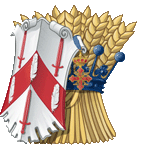The Lordship and
Manor of
Rushton or Rushton James (Staffordshire)
It should be noted that although there is
an
assumption that manorial rights were extinguished when the
lord sold
all his freehold land in the township of Rushton James
this did not
affect the title or
dignity of the lordship which remains today. Manorial
Rights are rights
that were retained
by the lord of the manor when the land became freehold.
They can
include rights relating to mines and minerals, rights to
hunt, shoot or
fish.
Manors are of ancient origin dating from before Norman times. The extent of the manor was usually determined by the original grant from the Crown or superior lord. A manor was self-contained with its own customs and rights within its defined area.
There are three separate elements to a manor.
Lordship of the manor – whoever owns the lordship of the manor is entitled to refer to themselves as lord of that manor, for example, Lord of the manor of Rushton James.
Manorial land – because a manor was a defined area it included the physical land within that area. Such land could either be freehold or leasehold.
Manorial rights – rights which were part and parcel of the manorial title and which were usually kept by the lord on disposal of parts of the manorial land, for example, the right to hunt, shoot or fish.
These elements may exist separately or be combined. The lordship title cannot be subdivided, but the manorial land and the manorial rights can be.
Confusion can be caused, as ‘manor’ can refer to either the lordship and/or the manorial land.
Manors are of ancient origin dating from before Norman times. The extent of the manor was usually determined by the original grant from the Crown or superior lord. A manor was self-contained with its own customs and rights within its defined area.
There are three separate elements to a manor.
Lordship of the manor – whoever owns the lordship of the manor is entitled to refer to themselves as lord of that manor, for example, Lord of the manor of Rushton James.
Manorial land – because a manor was a defined area it included the physical land within that area. Such land could either be freehold or leasehold.
Manorial rights – rights which were part and parcel of the manorial title and which were usually kept by the lord on disposal of parts of the manorial land, for example, the right to hunt, shoot or fish.
These elements may exist separately or be combined. The lordship title cannot be subdivided, but the manorial land and the manorial rights can be.
Confusion can be caused, as ‘manor’ can refer to either the lordship and/or the manorial land.
- See more at: http://www.landregistry.gov.uk/professional/guides/practice-guide-22#sthash.M5UjZgiq.dpuf

